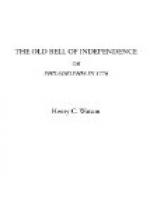“But what became of the two sons who were captured by the tories and Indians?” inquired young Harmar.
“They were carried to Canada,” replied Morton. “They afterwards asserted that nine of the wounded tories died on the way. But some of the Indians were resolved to have revenge for their defeat, and they lurked in the woods near Shell’s house. One day they found the wished-for opportunity, and fired upon Shell and his boys while they were at work in the field. One of the boys was killed, and Shell so badly wounded that he died soon after, at Fort Dayton.”
“Revenge seems a part of an Indian’s nature,” remarked young Harmar.
“Yes,” said Higgins, “they will pursue one who has injured them in any way until he has paid for it.”
“Our people suffered much from them during the Revolution,” added Higgins, “and they want no instruction in regard to their character.”
STORY OF BATE’S BEVENGE.
“I recollect,” said old Harmar, “after our line went south, under General Wayne, just after the surrender of Cornwallis, I met some of the men who had passed through Green’s campaign. They were the bitterest kind of whigs—men who had seen their houses burnt over their heads, and who could have killed and eaten all the tories they should meet. They told me many wild stories of the black doings of those traitorous rascals.”
“Tell us one of them, won’t you?” entreated Mrs. Harmar.
“Come, father, spin us one of those yarns, as the sailors say,” added her husband. The children also became clamorous for ‘a story,’ and the old veteran was compelled to comply.
“Well, you shall hear. A man named Joe Bates told me how he had been used by the enemy, and how he had been revenged. He joined the southern army when Greene first took command of it, leaving his wife and two children at his farm on the banks of the Santee River. His brother, John Bates, promised to take care of the family and the farm. You see, John used to help Marion’s band whenever he could spare the time—he was so anxious to do something for the good of his country, and he didn’t know how else he could do it than by




